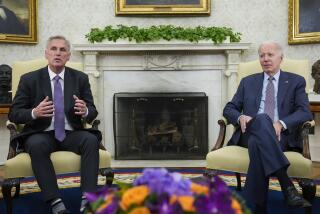Democrats Seen Blocking Vote on Capital Gains
- Share via
WASHINGTON — President Bush has enough votes in a key House committee to win approval of a capital gains tax cut, one of the Administration’s top economic priorities, but House Democratic leaders are blocking a vote, the President’s budget director said Sunday.
Richard G. Darman, director of the Office of Management and Budget, also denied persistent reports that Bush would accept higher income tax rates or other tax increases in return for a deal on the capital gains tax on profits from asset sales.
“We believe that right now we have the votes for a satisfactory capital gains proposal in the (House) Ways and Means Committee,” Darman said on CBS’ “Face the Nation.” “Our only problem is the Speaker and the chairman of the committee won’t actually bring it up for a vote.”
Seen as Litmus Test
House Speaker Thomas S. Foley (D-Wash.) and Ways and Means Committee Chairman Dan Rostenkowski (D-Ill.) appear to have made the capital gains issue a litmus test of party loyalty and are putting pressure on six conservative Democrats on the committee who are leaning toward a capital gains tax cut.
Under a proposal by committee member Ed Jenkins (D-Ga.), 30% of any gains realized from the sale of most income-producing assets would be excluded from taxable income during a period beginning with committee approval of the plan and lasting until Dec. 31, 1991.
After that date, the 30% exclusion would end, and capital gains would be indexed, which means that any profits attributable to inflation would not be taxed. Any profits exceeding the inflation rate would be taxed at the same rate as ordinary income.
Applies to Individuals
The Jenkins proposal would apply to profits from the sale of stocks, bonds, real estate and most other income-producing assets held for at least one year. It would apply only to individual taxpayers, not businesses or corporations.
Last spring, Rostenkowski backed a proposed one-year reduction in the capital gains tax and also favored indexing future gains to compensate for inflation. But he reversed course after hearing from Foley and other House Democratic leaders that a capital gains tax cut would be considered a giveaway to higher-income taxpayers.
A substantial number of middle-of-the-road and conservative Democrats, however, are believed to be willing to support a plan like the Jenkins proposal. The other Democratic members of the Ways and Means Committee likely to support a capital gains tax cut are J. J. Pickle and Michael A. Andrews of Texas, Ronnie G. Flippo of Alabama, Beryl Anthony Jr. of Arkansas and Andrew Jacobs Jr. of Indiana.
Viewed as Boosting Revenue
Supporters of the Jenkins plan contend that investors would rush to take advantage of a temporary tax reduction by cashing in their gains on stocks, bonds and other assets, thereby increasing revenue and reducing the budget deficit.
In addition, there is widespread agreement among both Republicans and Democrats that taxing inflationary gains at the same rate as current income is fundamentally unfair, so some sort of indexing proposal probably would gain broad bipartisan support.
The Bush Administration has argued that reducing the capital gains tax would produce a net gain to the economy by spurring investment. Evidence exists that economic growth occurred when the capital gains tax was reduced in several phases in the late 1970s and early 1980s, but many economists and Democrats believe the benefits of such cuts are temporary.
Studies Called Flawed
Recent projections by the Treasury and other government agencies that capital gains revenue would drop in the long run if the tax rate were cut are “flawed,” Darman said. The studies “don’t assume that there’s a favorable effect in terms of an increase in long-term economic growth. And, of course, one of the fundamental reasons for a reduction in the capital gains rate is to increase long-term economic growth, which then produces more revenue.”
Darman was unequivocal in denying recurring reports that Bush is ready to trade higher taxes next year for a capital gains tax cut.
“No,” he said. “The President has had discussions with the Speaker and with the chairman (Rostenkowski). But the President is firmly committed to his pledge not to raise taxes, and we’re not talking about a deal . . . . Others are talking about it, but the Administration is not interested in that kind of deal.”
More to Read
Get the L.A. Times Politics newsletter
Deeply reported insights into legislation, politics and policy from Sacramento, Washington and beyond. In your inbox twice per week.
You may occasionally receive promotional content from the Los Angeles Times.










